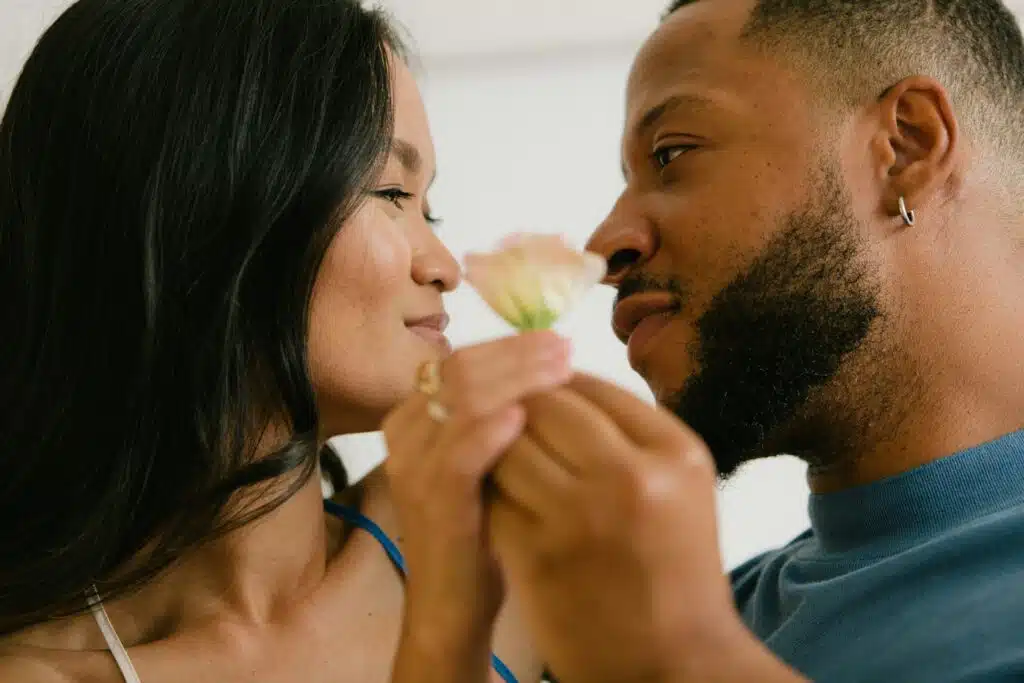Every relationship has its highs and lows, but what happens when the lows start to overshadow the good times? When you’re faced with the possibility of a breakup, it can feel overwhelming, leaving you questioning where things went wrong and how to make them right again.
The truth is that every relationship will face rough patches. These challenges don’t necessarily signal the end; instead, they offer an opportunity to rebuild, reconnect, and grow stronger together—if both partners are willing to make the effort.
For couples who are genuinely invested in each other, acknowledging a relationship’s struggles can be the first step toward healing. This awareness fosters openness and honesty, creating a foundation upon which positive change can be built.
With the right approach, couples can turn moments of crisis into chances for growth and transformation. However, saving a relationship isn’t about one partner trying to “fix” everything alone—it’s a shared journey where both individuals must show commitment, patience, and empathy.
This guide will explore practical strategies to help couples reignite their connection and work through their issues healthily and sustainably.
Recognizing Crisis Signs in Your Relationship
Recognizing crisis signs in a relationship goes beyond noticing visible conflicts or moments of tension; it involves tuning into subtle emotional cues and underlying shifts that speak to deeper issues.
Often, a relationship in crisis may reveal itself through feelings of disconnection or emptiness that can be hard to articulate—like sensing an invisible barrier between you and your partner, even when everything seems fine on the surface.
These feelings can stem from unaddressed emotional wounds, unresolved resentment, or unspoken fears that gradually build distance. You may also sense a persistent feeling of “walking on eggshells,” where even everyday conversations feel tense, as though one wrong word could spark an argument.
Another crisis sign to watch for is a sense of loneliness within the relationship. Feeling emotionally isolated, despite being physically close, can point to a deeper disconnect that’s often rooted in unmet needs for validation, support, or shared emotional intimacy.
Recognizing these intangible signals requires emotional awareness and honesty, both with yourself and your partner. Acknowledging them early can be a critical step in addressing unspoken struggles and opening pathways to deeper communication, allowing you to nurture a relationship that feels fulfilling and connected once again.
Identifying Emotional Distress and Behavioral Changes
Emotional distress in a relationship often manifests in ways that go beyond visible changes in behavior. It seeps into the energy between partners, creating an atmosphere that feels subtly strained or heavy, even during routine interactions.
One partner might feel a recurring sense of sadness or anxiety within the relationship but struggle to pinpoint its exact cause. This can stem from unresolved inner conflicts—perhaps fears of vulnerability, unspoken insecurities, or doubts that the partner may not even be fully aware of themselves.
Often, this can lead to self-sabotaging behaviors that aren’t immediately noticeable, such as emotionally distancing oneself even while physically present, or becoming excessively critical as a way of deflecting personal feelings of inadequacy.
A partner may still respond to messages or engage in conversation but in a way that feels devoid of warmth or genuine engagement, which can leave the other partner feeling as though they’re speaking to someone emotionally “not there.”
These shifts can create a pattern of disconnection where, on the surface, communication continues, yet it lacks the emotional depth that once existed. Identifying these intangible signs requires not only being attentive to behavioral changes but also cultivating empathy and emotional awareness.
Recognizing that these shifts are often protective responses to deeper fears or unresolved pain can open up opportunities for compassionate dialogue. Addressing these layers of distress with patience and gentleness fosters a space where healing, trust, and authentic connection can begin to rebuild.
Understanding Communication Breakdown
A common culprit of relationship strife is communication breakdown. When partners no longer express themselves openly or listen to each other, misunderstandings and resentments can accumulate. It’s vital to pinpoint where communication falters and work together to find solutions that foster clear and compassionate exchanges.
The Role of Active Listening in Mending Conversations
Active listening is a cornerstone of effective communication and a critical tool to ensure a relationship can be saved. It involves fully concentrating on what is being said, understanding the message, and responding thoughtfully. By practicing active listening, partners can mend conversations, bridge gaps in understanding, and create a more supportive dialogue.

Assessing Relationship Health and Viability
To save your relationship, it’s necessary to assess its overall health and viability objectively. This involves reflecting on whether the relationship fosters mutual growth and happiness and whether both partners are willing to try to overcome challenges. An honest evaluation can clarify the steps needed to improve or, in some cases, acknowledge that parting ways might be the best solution.
Determining the Depth of Commitment
The longevity of a relationship often hinges on the depth of commitment from both partners. Understanding each other’s level of dedication can shed light on the likelihood of overcoming obstacles and sustaining the union long-term. It’s essential to gauge how invested both individuals are in working through difficulties and upholding their bond.
Weighing the Pros and Cons of Staying Together
Consider everyday moments like watching TV or picking up the kids, and reflect on whether these incorporate a daily relational vitamin, such as appreciation or admiration. Assessing how well you solve problems and build mutual respect is key to deciding your relationship’s future.
When Letting Go May Be the Healthier Option
Sometimes, the most compassionate choice for both partners is to let go. Recognizing when a relationship has run its course and when individual paths must diverge is a brave and necessary step toward healing and personal growth.
Building Trust After a Breach
Trust issues can severely impact a relationship, but with mutual commitment, trust can be rebuilt. The process of rebuilding trust takes time and involves both partners sincerely committing to rebuilding.
Understanding each other’s perspective and cultivating empathy for your partner’s feelings is essential as you navigate this challenging phase.
Steps to Reestablishing Honesty and Transparency
To restart your relationship on a foundation of honesty and transparency, both individuals must be willing to dig deep and confront uncomfortable truths. Rebuilding the relationship requires consistent, genuine efforts and a commitment to fix a relationship that may have been damaged.
In healthy relationships, partners hold each other accountable and work together to maintain open lines of communication.
The Importance of Forgiveness and Accountability
Forgiveness and accountability are two sides of the same coin in healing a relationship. Both are necessary for moving forward with trust and respect.
Seeking Professional Help for Trust Issues
If trust issues persist, seeking professional help can provide a neutral space to address them. Therapists specialize in guiding couples through the complexities of rebuilding trust and can offer strategies and support to those committed to saving the relationship.
Navigating the Challenges of Distance
Long-distance relationships present unique challenges that require extra effort and creativity to maintain. Trust, communication, and commitment are tested when partners are physically apart, making it crucial to establish routines that nurture the relationship and keep the emotional connection alive.
Keeping the Spark Alive in Long-Distance Relationships
In long-distance relationships, keeping the spark alive demands intentionality. The relationship requires consistent effort to ensure a lasting connection. Strategies such as resetting the relationship with new goals, regular check-ins, and maintaining kindness and respect despite the distance are vital for sustaining love and intimacy across miles.
Strategies for Effective Communication Across Miles
Long-distance relationships require maintenance, and effective communication is its cornerstone. Regular video chats, sharing daily experiences through messages or emails, and clear articulation of needs and expectations can bridge the gap. It’s crucial to prioritize calm and honest conversations, which foster understanding and intimacy from afar.
Regular Visits and Future Planning
While technology helps, physical presence is irreplaceable. Planning regular visits reassures commitment and strengthens bonds. These visits offer a respite from the distance and create cherished memories.
Additionally, discussing plans aligns both partners towards a common goal, providing hope and sustaining the relationship through challenging periods of separation.
Cohabitation Conflicts and Solutions
Cohabitation presents unique challenges; however, active listening and expressing concerns with “I” statements can mitigate conflicts. These strategies encourage partners to understand each other’s perspectives without triggering defensiveness. It’s about creating a safe space for dialogue where both feel heard and respected, leading to mutually agreeable solutions.
Balancing Personal Space With Shared Responsibilities
Striking a balance between personal space and shared responsibilities requires clear communication patterns and a fair division of chores. It’s important to address unresolved issues promptly to prevent resentment.
Openly discussing each other’s needs for alone time and a collaborative approach to tasks can create harmony within the home.
Cultivating Affection and Appreciation in Daily Life
Small gestures of affection and verbal appreciation can profoundly impact a couple’s daily life. They reinforce love and respect, reminding partners of their value to each other.
Importance of Individual Growth Within a Shared Home
Encouraging individual pursuits within the framework of cohabitation contributes to a healthy relationship. It allows space for personal development, which in turn can enhance the collective happiness of the couple. Supporting each other’s goals and celebrating individual achievements fosters mutual respect and a deepened bond.

Recovering from Disagreements and Disputes
Even the strongest relationships face disagreements. To recover, it’s essential to approach conflicts calmly, seeking solutions rather than assigning blame. This mindset, coupled with a willingness to understand and adapt, can transform disputes into opportunities for growth and deeper understanding.
Conflict Resolution Techniques for Couples
Effective conflict resolution is pivotal in maintaining a healthy relationship. Techniques such as taking turns to speak without interruption, focusing on the issue at hand, and seeking compromise can lead to resolutions that satisfy both parties. This approach prevents the escalation of conflicts and nurtures a culture of respect.
Breaking the Cycle of Recurring Arguments
Identifying patterns in recurring arguments is the first step toward breaking the cycle. Understanding the underlying issues can pave the way for meaningful change and resolution.
The Power of Empathy and Compromise in Healing Rifts
A relationship can be saved by harnessing the power of empathy and compromise. Empathy allows partners to understand each other’s feelings and perspectives, while compromise shows a willingness to meet halfway. Together, they can heal rifts and strengthen the relationship’s foundation, leading to a more resilient partnership.
Restoring Intimacy and Connection
Restoring intimacy requires addressing unresolved issues with open communication. Holding hands and other small physical gestures can reignite closeness. Becoming an advisor and supporter to each other strengthens the emotional bond, making the relationship more resilient and connected.
Actions to Rekindle Romance and Physical Closeness
It’s crucial to ensure that the relationship is a safe space, free from abuse. To rekindle romance, plan memorable dates, explore new activities together, and prioritize time for intimacy. These actions can reignite the spark and foster physical closeness, critical components of a loving relationship.
Encouraging Open Dialogue About Desires and Boundaries
Open dialogue about personal desires and boundaries is essential for mutual understanding and respect within a relationship.
The Significance of Date Nights and Quality Time
Regular date nights and quality time spent together are vital for maintaining a strong connection. These moments away from daily routines allow couples to focus on each other, reaffirm their commitment, and create shared experiences that enrich the relationship.
Personal Growth as a Path to Relationship Recovery
Personal growth is a powerful tool for relationship recovery. Engaging in self-reflection, seeking guidance from a clinical psychologist, or undertaking activities that foster emotional connection can improve one’s well-being.
As individuals become healthier and happier, the relationship benefits from these positive changes, leading to a stronger, more fulfilling partnership.
Embracing Self-Reflection and Self-Improvement
Embarking on a journey of self-reflection is crucial when striving to save a relationship. It requires individuals to delve into their core values and strengths, evaluating how these fundamental aspects contribute to the partnership.
Self-improvement is not about changing who you are but enhancing the positives and addressing the negatives constructively. This process allows for personal growth, which can radiate positive change within the relationship, fostering a healthier dynamic and encouraging mutual growth and understanding.
Recognizing the Impact of Individual Happiness on the Relationship
A person’s individual happiness is the bedrock of a successful partnership. When individuals are content and fulfilled, their positivity can infuse the relationship with energy and love.
Maintaining Independence While Building a Partnership
While aiming to save a relationship, it’s essential to maintain a balance between independence and togetherness. “To truly thrive, partners must cultivate their interests and friendships, creating a robust and enriching life both within and outside the relationship,” says Dr. Jane Smith from Oakland University.
This approach preserves individuality and brings fresh energy and experiences to the partnership, ultimately strengthening the bond.

Professional Guidance and Couple’s Therapy
When a relationship faces turbulence, seeking professional guidance through couples therapy can be an invaluable step. Couples therapy offers a structured environment to address a damaged relationship, providing relationship advice rooted in expertise.
Additionally, individual therapy can support partners in working through personal issues that may impact the relationship, paving the way for healing and reconciliation.
When to Consider Counseling for Relationship Issues
Counseling should be considered when partners feel their efforts alone are not leading to a fulfilling relationship. This is especially true if communication has broken down or negative patterns have taken hold, making it difficult to see a path forward together.
The Role of Therapy in Facilitating Communication and Healing
Therapy plays a pivotal role in breaking down communication barriers and fostering a space where healing can begin.
Choosing the Right Therapist for Your Relationship Dynamics
Selecting the right couples therapist is crucial for effective therapy. It’s important to find a professional who resonates with both partners, understands their unique dynamic, and offers strategies tailored to their specific challenges.
A therapist’s ability to create a safe and neutral space will allow for more open and honest dialogue, facilitating the healing process.
Fostering a Supportive and Positive Environment
A supportive and positive environment is essential for a relationship’s health. It nurtures the growth of both individuals and the couple as a unit, providing a haven for open communication and mutual support.
Such an atmosphere encourages partners to work through challenges constructively and to celebrate each other’s achievements, reinforcing their bond.
Creating a Culture of Gratitude and Acknowledgment
Creating a culture of gratitude and acknowledgment within a relationship can significantly enhance its quality. Regularly expressing appreciation for each other’s efforts and achievements builds a foundation of respect and admiration. This practice fosters a positive atmosphere where both partners feel valued and understood, thereby strengthening their connection.
The Benefits of Shared Goals and Experiences
Shared goals and experiences bring couples closer, enriching their bond with common purpose and memories.
Balancing Couple Time With Social Networks and External Interests
Maintaining a healthy balance between couple time and individual pursuits is key to a thriving relationship. Partners should encourage each other to engage with social networks and pursue external interests. This balance allows for personal growth and prevents the relationship from becoming stifling, while also providing the opportunity to bring new insights and energy back into the partnership.
Common Questions About Turning Relationships Around
Many wonder if a breach of trust or underlying issues can be overcome to save a relationship. The answer lies in the willingness of both partners to address these challenges head-on.
Addressing the relationship’s physical and emotional aspects is necessary for healing and moving forward. Turning a strained relationship around is possible with dedication and the right strategies.
Finding Hope After Falling Out of Love
Even after falling out of love, hope for reconnection can emerge with effort and time.
The Impact of Giving Space and Setting Boundaries
Giving space and setting boundaries can have a transformative effect on a struggling relationship. By respecting each other’s need for personal space and establishing clear boundaries, partners can reduce tension and create an atmosphere of trust and respect. This approach allows for the necessary breathing room to reflect, grow, and ultimately come back together with a renewed sense of purpose and understanding.
A Comprehensive Plan to Rescue Your Relationship
Developing a comprehensive plan is essential to navigate the ups and downs of a relationship. Couples therapy can provide valuable tools and insights to address trust issues and transform an unhealthy relationship into a healthy one.
Couples can strengthen their relationship and build a more resilient and loving partnership by implementing the strategies learned in therapy and continuously working on communication.
Implementing Changes and Tracking Progress
Reviving a floundering relationship requires concrete steps and the ability to track improvements over time. Couples should practice active listening, ensuring that each person feels heard and validated. Utilizing “I” statements helps in expressing feelings without casting blame, fostering healthier exchanges.
Consistently applying these tools regularly allows partners to gauge their progress, discerning positive changes and areas needing further work. Monitoring this advancement is vital to the long-term success of the relationship.
Celebrating Successes and Learning from Setbacks
Every step forward is a victory in the journey of relationship recovery. Acknowledge the growth and learn from missteps, understanding that they are part of the process.
Continual Improvement and Adaptation for Relationship Longevity
Relationships are dynamic, with inevitable ups and downs. To strengthen your relationship, it’s crucial to adapt to changes and maintain a commitment to growth.
Couples therapy can be an invaluable resource, providing guidance through difficult times and helping to identify unhealthy relationship patterns. The key is to view each challenge as an opportunity for deeper understanding and connection.

The Rewards of a Revived and Strengthened Relationship
The journey through couples therapy or counseling can be transformative, offering profound rewards for those committed to saving their relationship. Though engaging in relationship counseling can be challenging, it fosters the kind of communication and understanding that fortifies a long-term relationship. The investment of time and emotional energy pays off in a deeper, more resilient bond.
Conclusion: The Journey to Rekindle Your Love
In conclusion, while the path to rekindling love can be complex, it is a journey worth embarking upon. It’s about embracing the process of healing and fostering reconnection step by step.
The journey towards healing a relationship involves nurturing mutual respect, managing negative emotions, and mindfully sharing thoughts and intentions. It’s essential to avoid accusatory phrases and forming a rebuttal while your partner is speaking.
Instead, establish clear rules and boundaries from the beginning. By taking these steps, you steer conversations from a loving perspective, minimizing negative feelings and keeping the relationship fresh. Such efforts can break negative cycles and support mental health, creating a loving and sustainable bond.

